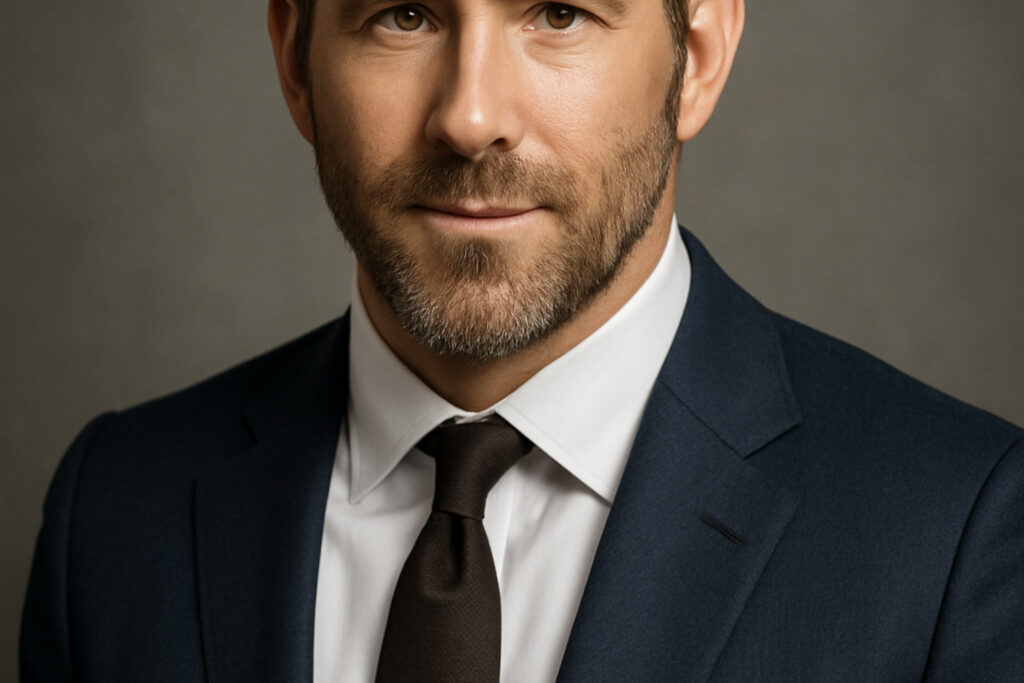From Deadpool to Financial Empire: Understanding Ryan Reynolds’ Wealth
Ryan Reynolds’ Net Worth has become one of Hollywood’s most fascinating success stories. The Canadian-born actor has built an estimated fortune of $350 million as of 2024, but here’s the surprising part: most of his wealth doesn’t come from acting.
Quick Facts About Ryan Reynolds’ Net Worth:
- Current Net Worth: $350 million (2024)
- Primary Income Sources: Business ventures (70%), Acting (30%)
- Biggest Paydays: Aviation Gin sale (~$122 million), Mint Mobile sale (~$300 million)
- Acting Peak: $30-40 million per film after Deadpool success
- Business Strategy: “Buy, Boost, Sell” model using his marketing company
Reynolds transformed from a teen soap opera actor earning $150 per episode to one of Hollywood’s shrewdest businessman-actors. His breakthrough came with the Deadpool franchise, where he took a $2 million base salary but earned over $22 million from backend profits when the film grossed $782 million worldwide.
But the real magic happened off-screen. Reynolds perfected what industry insiders call the “Buy, Boost, Sell” strategy – acquiring stakes in promising companies, using his marketing genius to boost their value, then selling for massive profits. This approach turned investments in Aviation Gin and Mint Mobile into hundreds of millions in returns.
His journey shows how modern celebrities can leverage their personal brand beyond traditional entertainment income. From co-owning Welsh football club Wrexham AFC to investing in Formula 1 racing teams, Reynolds has diversified his portfolio while maintaining his authentic, humorous public persona.
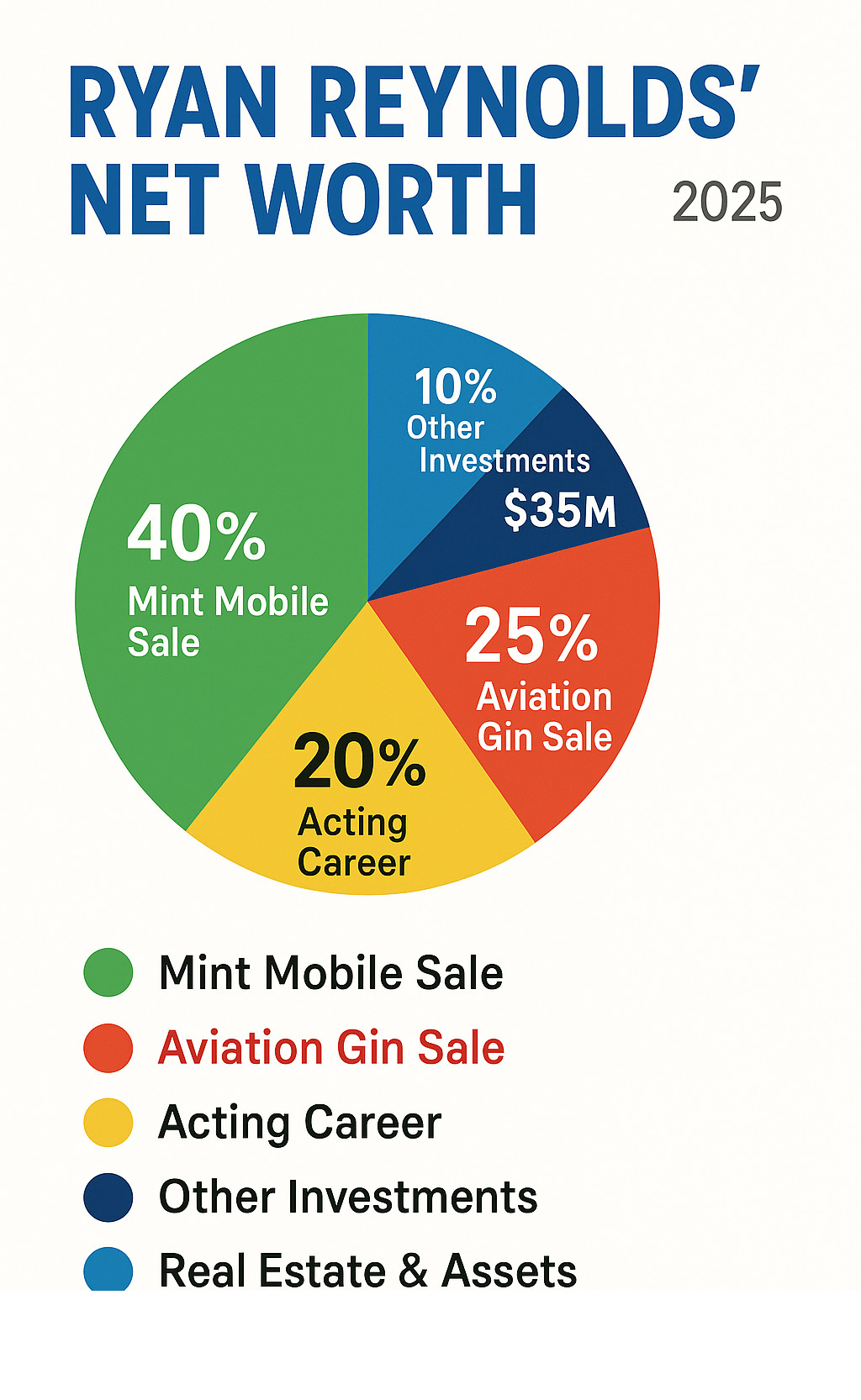
Easy Ryan Reynolds’ Net Worth glossary:
The Hollywood Fortune: Building a Foundation on Blockbuster Paychecks
Ryan Reynolds’ Net Worth might be powered today by business wizardry, but the seed money still came from Hollywood. His acting career provided both capital and the global name-recognition he later parlayed into nine-figure deals.
From Teen Soaps to A-List Star
Reynolds began humbly, earning $150 per episode on the Canadian teen soap Fifteen. A string of sitcoms – culminating in Two Guys, a Girl and a Pizza Place (1998-2001) – sharpened his comedic timing. Although 2011’s Green Lantern flopped with critics, Warner Bros. still paid him $15 million, officially placing him in the A-list salary bracket.
The ‘Deadpool’ Effect: A Game-Changing Payday
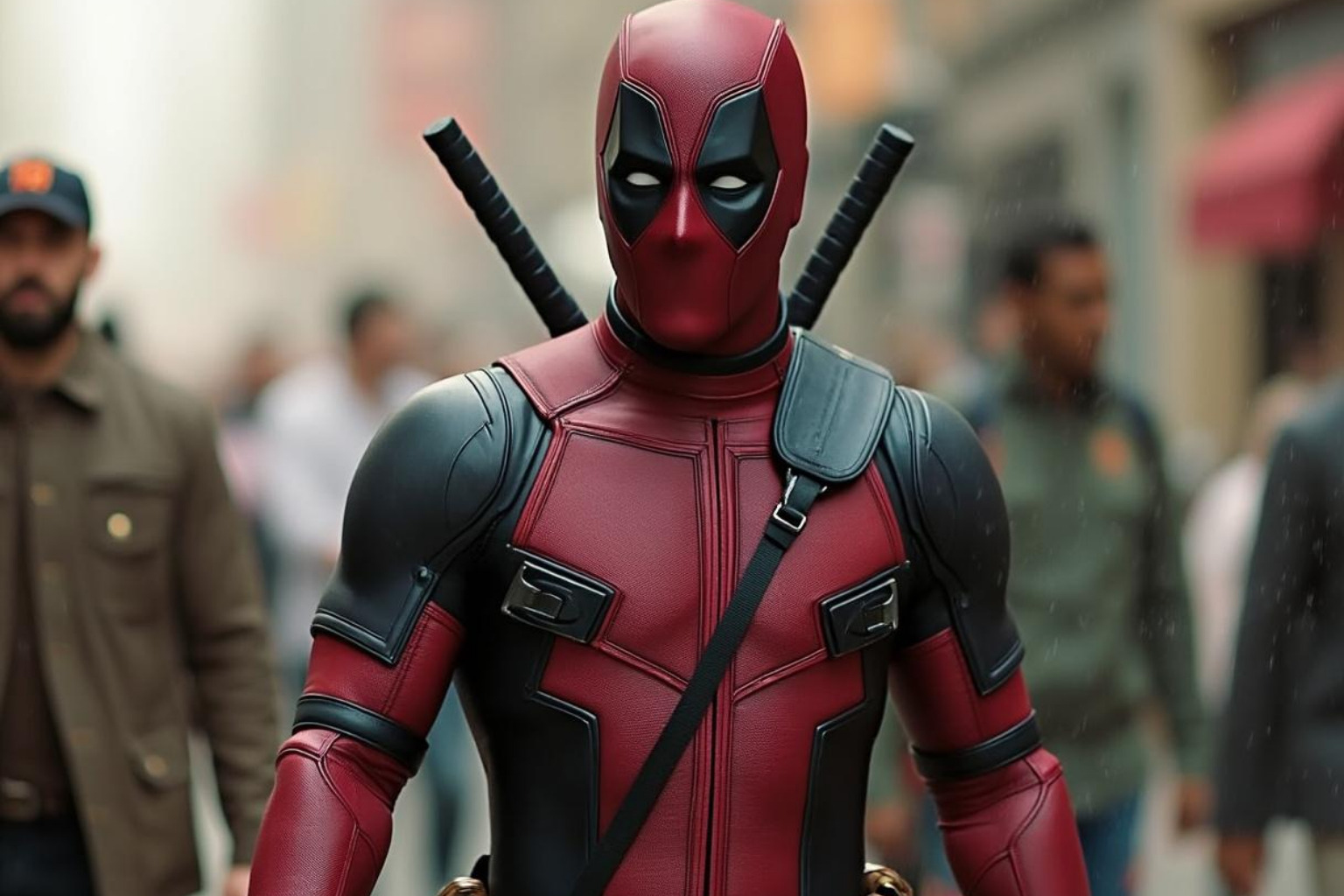
Reynolds’ boldest move was accepting $2 million upfront for Deadpool (2016) in exchange for generous profit participation. The film’s $782 million global gross pushed his take to roughly $22 million and reset his market value. For Deadpool 2 (2018) he secured at least $20 million upfront plus backend, and industry analysts estimate he will clear well over $60 million from 2024’s Deadpool & Wolverine.
Quick Streaming Windfalls
The streaming era added easy, risk-free paydays: $27 million for Netflix’s 6 Underground (2019), $21 million for Red Notice (2021), and $20 million-plus for Apple TV+ musical Spirited (2022). Together, these salaries supplied the cash cushion that let Reynolds chase larger opportunities without worrying about the next movie contract.
All told, acting now represents roughly 30 percent of Ryan Reynolds’ Net Worth, yet it remains the foundation upon which his “Buy, Boost, Sell” empire is built.
The “Buy, Boost, Sell” Strategy: Reynolds’ Business Playbook
Ryan Reynolds’ Net Worth truly exploded when he found his talent for business wasn’t just about making money – it was about telling stories that sell. His approach is deceptively simple: find good companies that need better marketing, use his creative genius to make them irresistible, then cash out when bigger players come calling.
This strategy has become Reynolds’ signature move in the business world. He doesn’t just write checks and hope for the best. Instead, he rolls up his sleeves and becomes the face of each brand, bringing his authentic humor and marketing expertise to transform how customers see these companies.
The results speak for themselves. While his acting career has been incredibly successful, his business ventures have generated over $400 million in personal returns from just two major deals. It’s a masterclass in how modern celebrities can leverage their personal brand for massive financial gain.
What makes Reynolds different from other celebrity investors is his hands-on approach. Through his production company Maximum Effort, he creates viral advertising campaigns that don’t feel like traditional ads. They feel like entertainment that happens to mention a product.
Case Study 1: The Aviation Gin Windfall
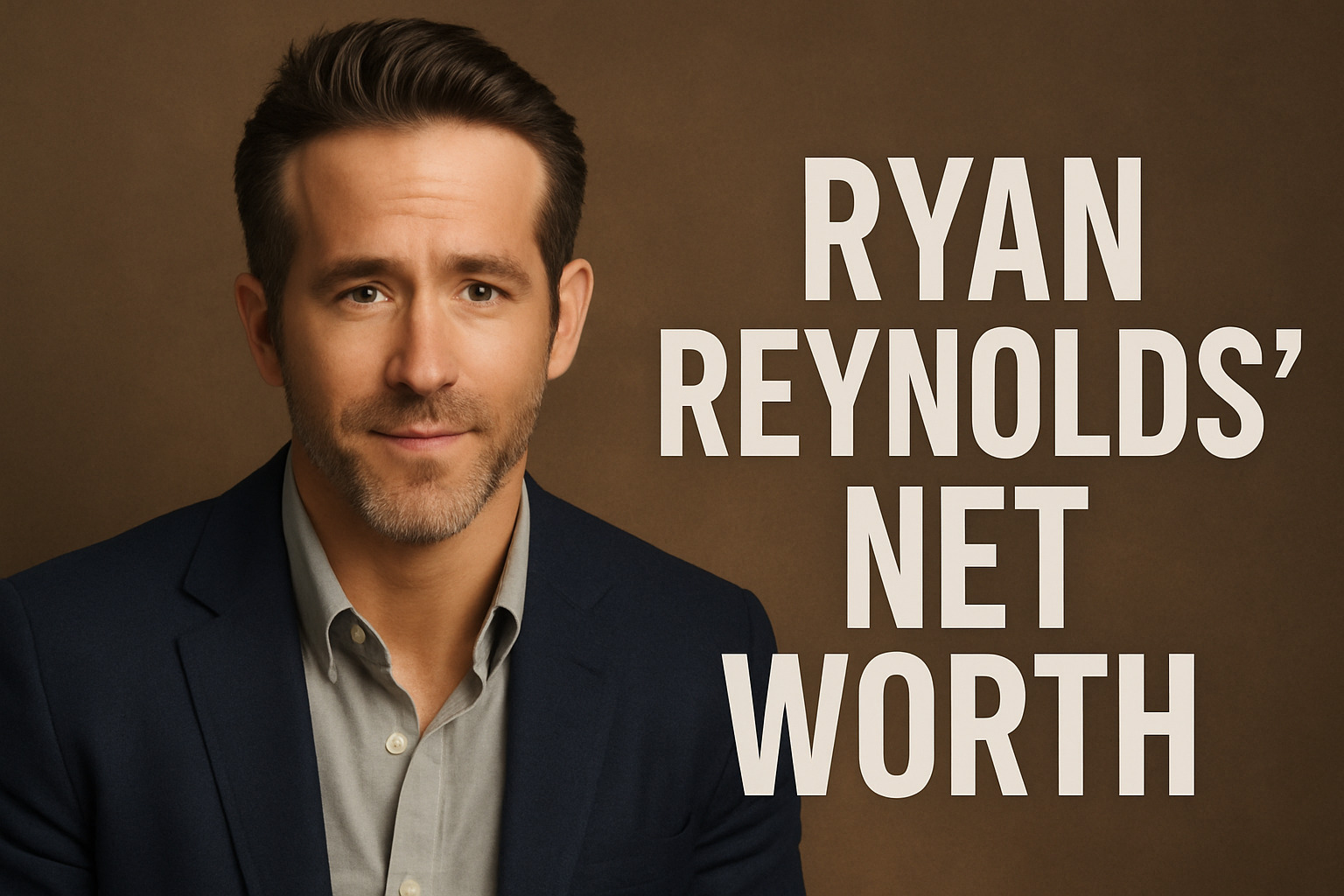
Reynolds’ first major business breakthrough came in 2018 when he acquired a significant stake in Aviation American Gin. But this wasn’t your typical celebrity endorsement deal. Instead of taking a one-time payment to smile with a bottle, Reynolds became the brand’s creative director and completely reimagined how gin could be marketed.
His campaigns were pure Reynolds magic. He created fake apologies to longtime frenemy Hugh Jackman, turned viral internet moments into gin commercials, and made ads that people actually wanted to watch. The “Peloton girl” controversy? Reynolds had Aviation Gin respond within days with a brilliant commercial that got millions of views.
The secret was authenticity. Reynolds’ self-deprecating humor and willingness to poke fun at himself made the brand feel genuine rather than corporate. People weren’t just buying gin – they were buying into Reynolds’ personality and sense of humor.
The change was remarkable. Aviation Gin went from a relatively unknown premium spirit to a brand that people actively sought out. When Diageo, one of the world’s largest beverage companies, came calling in 2020, they were willing to pay big money for what Reynolds had built.
The final deal was worth up to $610 million, with $335 million paid upfront and additional payments tied to performance milestones over ten years. Reynolds’ estimated 20% stake netted him approximately $67 million from the initial payment, with potential total earnings exceeding $122 million.
Read the official acquisition announcement from Diageo
Case Study 2: The Mint Mobile Fortune
If Aviation Gin was Reynolds’ proof of concept, Mint Mobile was his masterpiece. In December 2019, he acquired an estimated 25% stake in the budget wireless carrier and immediately began working his marketing magic.
Mint Mobile’s business model was perfect for Reynolds’ approach. The company offered affordable wireless plans by cutting out expensive retail stores and operating entirely online. They had a great product but needed someone who could explain why “cheap” was actually “smart.”
Reynolds’ solution was brilliant in its simplicity. He created deliberately low-budget commercials that looked cheap on purpose. He’d joke about the production values while highlighting the real savings customers could enjoy. The message was clear: we’re not spending money on fancy ads because we’re passing those savings on to you.
The campaigns felt authentic because they were. Reynolds genuinely seemed to believe in the product, and his humor made the brand memorable in a crowded market. Customers weren’t just switching carriers – they were joining Reynolds’ rebellion against overpriced wireless plans.
The growth was spectacular. Mint Mobile’s customer base expanded rapidly, and the company’s valuation soared. When T-Mobile decided to acquire the company in March 2023, they paid $1.35 billion for a business that had been valued at a fraction of that just a few years earlier.
Reynolds’ 25% stake translated to approximately $336 million in total value – $131 million in cash and $205 million in T-Mobile stock. After taxes, his immediate cash payout was estimated at $70 million, with the stock portion providing ongoing upside potential.
This single deal more than doubled Reynolds’ net worth and proved that his “Buy, Boost, Sell” strategy wasn’t just luck – it was a repeatable formula for massive financial success.
Expanding the Empire: Sports, Tech, and Beyond
Ryan Reynolds’ Net Worth continued to grow as he expanded beyond consumer brands into unexpected territories. His ventures into sports and technology showcase a businessman who understands that great stories can transform any industry – even Welsh football and Formula 1 racing.
The Wrexham AFC Fairytale
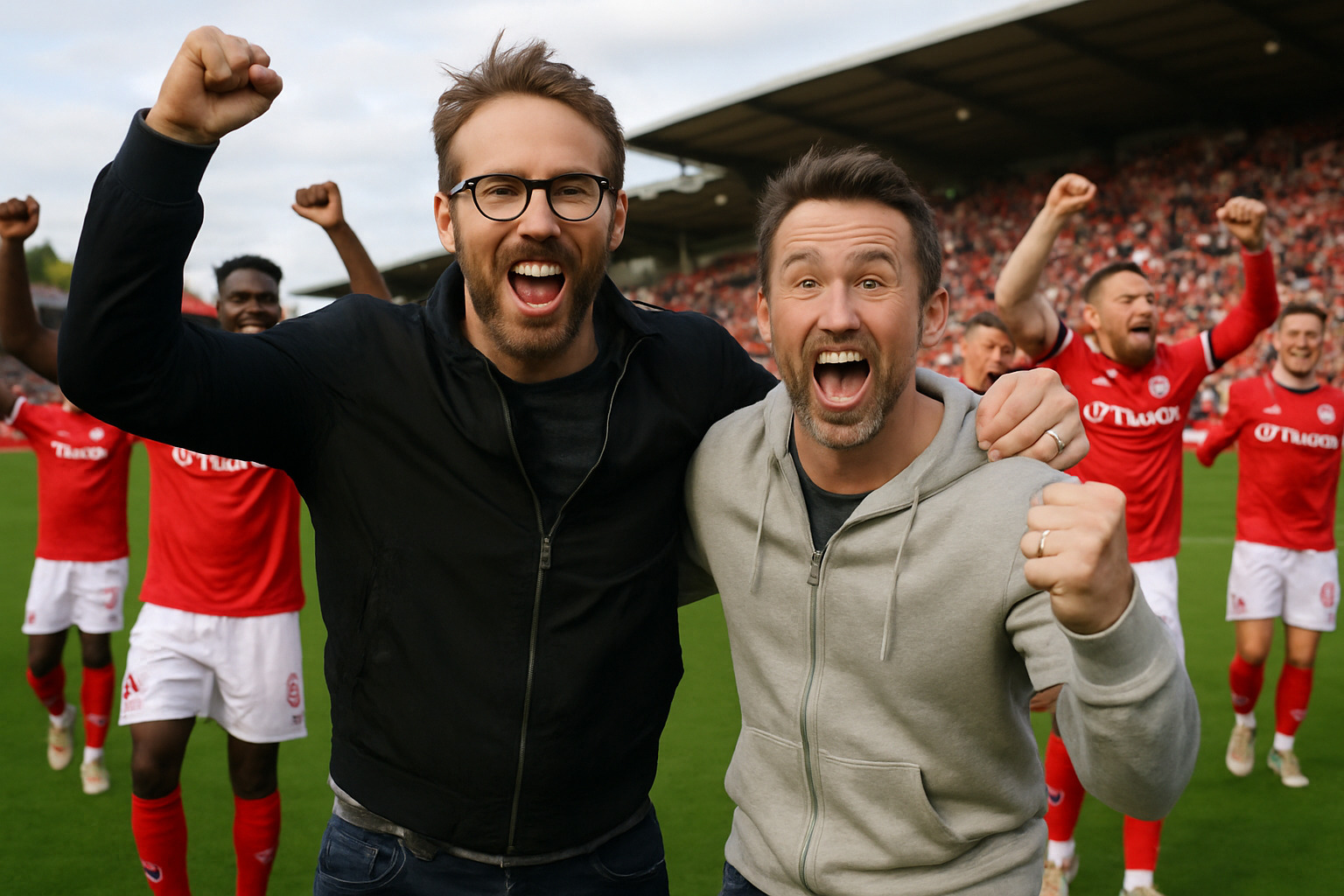
When Reynolds and fellow actor Rob McElhenney bought Wrexham AFC for just £2 million ($2.5 million) in 2020, many people scratched their heads. Two Hollywood actors buying a struggling Welsh football club in the fifth tier of English football? It seemed like an expensive hobby.
But Reynolds saw something others missed. Wrexham is the third-oldest football club in the world, with passionate fans and incredible history. The club had been stuck in lower divisions for over a decade – a perfect turnaround story waiting to happen.
Instead of just writing checks, Reynolds and McElhenney created compelling content around the club’s revival. The hit docuseries ‘Welcome to Wrexham’ on FX and Disney+ brought global attention to this small Welsh town and its beloved football team.
The results speak for themselves. Wrexham achieved back-to-back promotions, returning to the English Football League after 15 years away. The club’s revenue doubled, and its fanbase exploded worldwide. Suddenly, people in America were buying Wrexham jerseys and following Welsh football.
Most importantly for Reynolds’ wallet, the club’s valuation skyrocketed to an estimated $129 million – nearly a 5000% increase from what they paid. Even after investing roughly $12 million in improvements, the return on investment has been extraordinary.
The Wrexham success proves Reynolds’ genius lies in finding undervalued assets and changing them through authentic storytelling. The club now has major brand partnerships and global media presence that generates ongoing revenue.
From the F1 Track to Fintech
Reynolds’ investment appetite doesn’t stop at football. In June 2023, he and McElhenney acquired a 24% equity stake in the Alpine Formula 1 team for €200 million ($218 million). The deal valued the team at approximately $879 million, giving Reynolds exposure to F1’s rapidly growing market.
The timing looks brilliant. Formula 1’s popularity has exploded recently, especially in the United States, thanks partly to Netflix’s ‘Drive to Survive’ series. Team valuations have increased significantly with the sport’s growing global audience.
Reynolds has also made smart moves in Canadian fintech. His investment in Wealthsimple, an online brokerage that raised $750 million in 2021 at a $5 billion valuation, positions him in the growing digital finance sector.
He also invested early in Nuvei, a payment processing company acquired in 2024 for $6.3 billion. The company’s turnaround – from an $18.1 million loss to $17.2 million profit in Q3 2024 – shows Reynolds’ eye for change opportunities.
Additional investments include stakes in 1Password (valued at $6.8 billion after raising $620 million in 2022) and a board position at Match Group, the parent company of dating apps like Tinder and Hinge.
These diverse investments demonstrate how Reynolds applies his storytelling skills across industries. Whether it’s Welsh football or fintech, he understands that authentic engagement and compelling narratives can transform any business.
A Closer Look at Ryan Reynolds’ Net Worth and Lifestyle
With Ryan Reynolds’ Net Worth touching $350 million, many expect nonstop extravagance. Instead, Reynolds and wife Blake Lively balance comfort, privacy and purpose.
Real-World Assets, Not Flashy Toys
The couple’s primary residence is a secluded family property just outside New York City. Spacious enough for their four children and offering quick access to film and business hubs, it reflects the practicality that underpins Reynolds’ investments. After buying Wrexham AFC, he also purchased a modest home in North Wales so he can be hands-on with the club – proof that even his real estate choices support long-term projects rather than status flexes.
His vehicle lineup (valued at under $1.2 million) mixes occasional super-cars with hybrids and motorcycles, echoing the same “efficient but enjoyable” philosophy seen in his business deals.
Philanthropy With Multiplying Power
Reynolds and Lively often use a matching-donation strategy to inspire others while doubling impact – a theme as strategic as any Mint Mobile campaign.
- COVID-19 response: $1 million to North-American food banks.
- Ukraine relief: Pledged to match $1 million for UNHCR; the campaign ultimately delivered $2 million.
- Youth & Indigenous support: $500,000 each to Covenant House and Water First.
Their approach mirrors the Focus Keyphrase at the heart of this article, “Ryan Reynolds’ Net Worth”: wealth is a tool best measured by the stories and communities it can uplift.
Reynolds’ lifestyle choices, like his business strategy, show that authenticity, smart risk-taking and social responsibility can all coexist in one very marketable package.
Frequently Asked Questions about Ryan Reynolds’ Net Worth
What is Ryan Reynolds’ current estimated net worth?
Ryan Reynolds’ Net Worth stands at an impressive $350 million as of 2024, marking one of Hollywood’s most remarkable financial changes. To put this in perspective, just seven years ago in 2017, his net worth was estimated at around $21.5 million. This dramatic leap shows how his business ventures have completely revolutionized his wealth beyond what most actors could dream of achieving through films alone.
The $350 million figure comes from respected sources like Celebrity Net Worth and Forbes, though it’s worth noting that celebrity wealth calculations are educated estimates based on publicly available information. The real number could be even higher, considering some of his investments and business dealings remain private.
What makes Reynolds’ wealth particularly fascinating is how diversified it has become. Unlike many actors who depend solely on their next movie contract, Reynolds has built multiple income streams that continue generating money even when he’s not actively filming.
How much did Ryan Reynolds make from the ‘Deadpool’ movies?
The ‘Deadpool’ franchise represents Reynolds’ acting career masterpiece, both creatively and financially. While the exact numbers stay locked in Hollywood vaults, industry experts estimate he’s earned over $100 million from the three films combined.
His journey with the character shows brilliant strategic thinking. For the first ‘Deadpool’ movie, Reynolds took a calculated risk by accepting just $2 million upfront but negotiating a significant slice of the profits. When the film exploded to $782 million worldwide on a tiny $58 million budget, his total earnings soared to approximately $22 million.
‘Deadpool 2’ proved his newfound star power, with Reynolds commanding at least $20 million upfront. Combined with backend profits from the sequel’s $786 million gross, his total take likely reached $30-40 million.
The recent ‘Deadpool & Wolverine’ became his biggest payday yet. Reports suggest a $30 million upfront salary, but with the film’s record-breaking $1.35 billion worldwide gross, his total earnings from profit participation could approach $100 million for this single project.
What companies does Ryan Reynolds still own?
After cashing out of Aviation Gin and Mint Mobile for hundreds of millions, Reynolds hasn’t slowed down his investment strategy. His current portfolio shows he’s thinking even bigger and more globally.
Wrexham AFC remains his most visible investment, and what a success story it’s become. The Welsh football club he bought with Rob McElhenney for just $2.5 million is now valued at approximately $129 million. That’s nearly a 5000% return on investment, proving that Reynolds’ marketing magic works across cultures and industries.
His 24% stake in the Alpine Formula 1 team represents his biggest single investment, with the team valued at around $879 million. This positions him perfectly in Formula 1’s booming popularity, especially in the United States.
Technology investments keep Reynolds connected to the future economy. His stakes in Wealthsimple (valued at $5 billion) and 1Password (valued at $6.8 billion) show his eye for identifying companies before they explode in value. His recent investment in Nuvei, which was acquired for $6.3 billion in 2024, demonstrates this pattern continues to pay off.
His production company Maximum Effort remains central to his business strategy, even after being acquired by MNTN in 2022. Reynolds continues as chief creative officer, maintaining control over the creative direction that makes his marketing campaigns so effective.
What’s particularly smart about Reynolds’ current portfolio is how each investment reinforces the others. His media expertise helps Wrexham’s global growth, his Formula 1 involvement provides content opportunities, and his tech investments keep him connected to emerging trends that could become his next big opportunity.
Conclusion
Ryan Reynolds’ Net Worth journey to $350 million tells a story that goes far beyond typical Hollywood success. What makes his path so compelling isn’t just the impressive dollar amount – it’s how he completely rewrote the rules of celebrity business ventures.
Most actors stick to what they know: taking roles, collecting paychecks, and maybe launching a perfume line. Reynolds saw a different opportunity. He realized that his authentic voice and marketing genius could transform ordinary companies into extraordinary brands. His “Buy, Boost, Sell” strategy wasn’t just smart business – it was revolutionary.
The numbers speak for themselves. His business ventures have generated more wealth than his entire acting career, including the massive success of the Deadpool franchise. From Aviation Gin’s $122 million payday to Mint Mobile’s $336 million windfall, Reynolds proved that the right celebrity can add hundreds of millions in value to the right company.
But here’s what makes his story truly special: authenticity never goes out of style. Reynolds didn’t just slap his name on products and walk away. He became genuinely involved, creating marketing campaigns that felt real, funny, and honest. Whether he was joking about cheap production values for Mint Mobile or creating viral moments for Aviation Gin, his approach always felt genuine.
His willingness to take calculated risks – like accepting a smaller upfront salary for the first Deadpool movie or investing in a Welsh football club – shows the kind of strategic thinking that separates good business from great business. These weren’t just lucky breaks; they were carefully considered bets that paid off because he understood the value he could bring.
The Wrexham AFC investment perfectly captures Reynolds’ approach. He didn’t just buy a struggling football club – he bought into a community, a story, and a chance to create something meaningful. The 5000% increase in the club’s value came from genuine engagement, not just financial investment.
Perhaps most importantly, Reynolds has shown that massive financial success and social responsibility can work hand in hand. His significant charitable contributions, from COVID-19 relief to supporting Indigenous communities, demonstrate that wealth can be a tool for positive change.
The key lessons from Reynolds’ success are surprisingly simple: be authentic, take smart risks, and always look for undervalued opportunities. His journey from teen soap opera actor earning $150 per episode to business mogul worth $350 million proves that with the right mindset, extraordinary success is possible in any field.
Just as Reynolds has mastered the art of authentic brand building, we at Beyond Beauty Lab believe in the power of genuine wellness practices to transform lives. Our approach mirrors his business philosophy: real engagement, strategic thinking, and a commitment to creating lasting value.
Whether you’re building a business empire or cultivating personal wellness, the principles remain the same. Authenticity wins every time, strategic thinking pays off in the long run, and genuine commitment to creating value for others is the foundation of all lasting success.
Reynolds’ change from Canadian teen actor to Hollywood heavyweight to business mogul shows us that the most valuable asset anyone can have is their authentic voice – and the courage to use it in unexpected ways.

